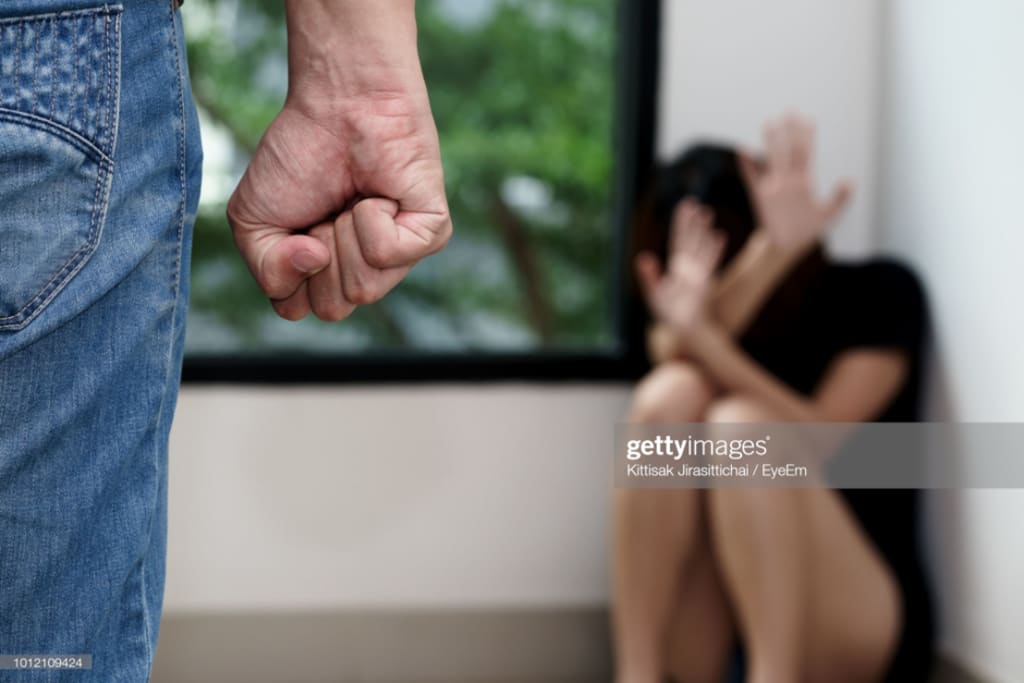
Domestic Violence – the unpopular opinion
First, I am not an expert and cannot speak for everyone who has been in a Domestic Violence situation. It’s an explosive subject, especially when a death occurs like recently in the news. I can speak from my own experience and realisation and it brings me a certain amount of fear and trepidation to do so, as mine is the unpopular opinion, and the truth is that I have lived through a lot of fear, so exposure in sharing feels very vulnerable.
Fear is what led me to stay in a Domestic Violence relationship. Low self-esteem is what attracted me to it and not being able to express my feelings is how I came to blame others for my rage.
You see as a child I watched it happen at home, it was never talked about, it didn't happen often, but it did happen. When I was 12, a crucial time for a young girl, my father died and I was left with a lot of unreconciled feelings about love, relationships and my own self-worth. I wasn't taught to love myself and in fact I believed that I was unlovable, ugly and worthless. I don’t know why those particular beliefs were what I took on board, I only know that I did.
When I got involved with my ex-husband, I was very young and impressionable. I was also rebellious and believed that no one loved me. I was pushing the boundaries daily. I was angry at the world and didn't want to live in it, the paradigm was that I wanted the exact opposite as well. I wanted to be loved and I wanted the fairy tale romance, and the perfect life, the Princess dream.
My ex-husband (the perpetrator as they say in DV terms) was an angry young man. He had been abused by his father and he had rage boiling away under the surface ready to erupt at any moment. He was broken, and I was needed. We had a lot in common on an unconscious level.
He was dangerous and it was like a drug to my broken, hurt and angry child. I was like a moth to a flame.
His behaviour of control, fear and rage showed up early in the relationship, but I buried the danger signs. He was also protective, loving and vulnerable. I told myself this person loved me, I decided that his love was more important to me and that I would be anything, do anything to keep it, even if it meant being a doormat. Even though it meant, physical, emotional, mental and sexual abuse.
I said YES to domestic violence, I did not say NO. I didn't walk away for 18 years.
Anyone who stays in any relationship has said YES to it, regardless of whether it has violence in it or not. The difference between a healthy relationship is simply that, a healthy emotional state. In Domestic violence some part of the person has decided to say that it's ok to treat me like this, I deserve it. It not a conscious decision. Consciously no one wants to be treated that way, and consciously the perpetrator does not want to behave that way either. It’s a dance that both people agree to. I have heard the words, "why doesn’t she just leave?" because it’s not black and white. It's messy, it’s lies we tell ourselves and lies we believe, and very real fears that we will be killed if we leave. (Victims are often killed after they have left)
The current climate in Domestic Violence is to blame the perpetrator. It is their fault 100% and the victim is the victim. Being a victim never helped me to give up my victim story. It was only when I was able to take responsibility for my part. Feel my shame and guilt for the way in which I had agreed, not consciously, to be treated that way. I had to own my rage which I was projecting instead of feeling. And of course in the relationship I could not express my rage at any time for fear of the consequences. He was physically stronger than me. Its only in hindsight that I am able to understand that the rage was in me too. He didn’t put it there. I had it all along.
Everyone in Domestic Violence is a victim and at the moment the emphasis is on the perpetrator to take responsibility for their actions. To unlearn behaviours, to face their shame and control their anger with programs like anger management and this is absolutely beneficial.
The Victim is nurtured, helped physically, emotionally, with practical and emotional solutions to begin again, and rightly so. As a Domestic Violence victim myself, the help that I received when I finally left my marriage was absolutely necessary and critical to my healing and success in not returning.
However, it wasn't until I took responsibility for my part that I truly began to heal and went from surviving to thriving. In facing my worst self, I was able to forgive myself and begin to love myself. It wasn't until that took place that I was able to release the victim and truly free myself from Domestic Violence.
Violence in all circumstance is wrong, it’s never the answer and yet it’s the world we live in. Hurt people, hurt people. We are not taught to love ourselves, to feel our feelings. We are taught to suppress them with drugs, alcohol, food, smoking, or shut them down (depression) we are taught to run from them, by keeping busy, workaholic, shopaholic, OCD, never sitting still, adrenaline fix. We are not taught to simply feel them. That it is safe to feel them.
When we shut them down, we expend so much energy trying to keep them under control, like one of those floaties in a swimming pool, we try to keep it under the surface and no matter how much energy, strength we use, it always bobs back up. Our feelings are not controllable and so we have outbursts of violence, rage, abuse, sometimes daily, weekly and sometimes years apart. Those feelings are projected on to others, or they are repressed into our bodies and can cause illness, disease, depression, anxiety, and mental illness.
Emotions are a natural part of healing for our bodies, they are an electro chemical change that takes place. They have no meaning other than the meaning we give them. If we resist and wrestle with them, we can make them last a long time, but if we soften our body and drop all resistance we can fully meet the emotion, and it will last only seconds or minutes – it naturally burns itself out, and we move on to the next experience. So, if we stop the story about emotions, stop the struggle of trying to control them and let our body know that all emotions are entirely safe to feel, we can go along way to taking responsibility for our own feelings. It’s actually the safest course of action for us to take. It’s ironic that most of us are scared of feeling 30 seconds of rage, desperation, sadness, anger, fear, terror, betrayal, hatred, or whatever it is that we have been conditioned not to feel and that the consequences of that are often violence.
I don’t have all the answers, I believe that both sides have a responsibility. If we as women can learn to respect, love and stand up for ourselves and not look to men for approval, love or self-esteem, then we can take our power back.
If Men can take responsibility for their own feelings and not project them or use their Masculinity to forcefully control their outcomes. If both men and woman can stop blaming outside circumstances, each other, their boss, or life, the weather, climate change, justice, or politicians or whatever outside circumstances we are blaming instead of feeling our feelings, then we have a chance to break the cycle.
If society can begin to understand that Men and Women are equal in worth. That the imbalance is because men commit more violence than women, not because they want to, but because they are programmed that way. That Men need to recognise this, admit it, take responsibility for changing it within themselves. Women do not provoke men’s violence, that violence is already there, men are provoked by their own mis conceptions, beliefs and ideas and if women can stop taking responsibility for everyone else, men included and only take responsibility for themselves then maybe we stand a chance.
In my own life, my first realisation was that I hadn’t done anything wrong, that I had a choice to live with violence or not, and I recognised myself as a victim of it. Gradually, through healing and building my self-esteem, I took ownership of my part in it and released the victim. Only then, was I able to forgive myself and my ex-husband fully.
Finally, because of that my fear was transformed into love and compassion and my relationship with my ex-husband changed completely.
By Jemma J






Comments
There are no comments for this story
Be the first to respond and start the conversation.